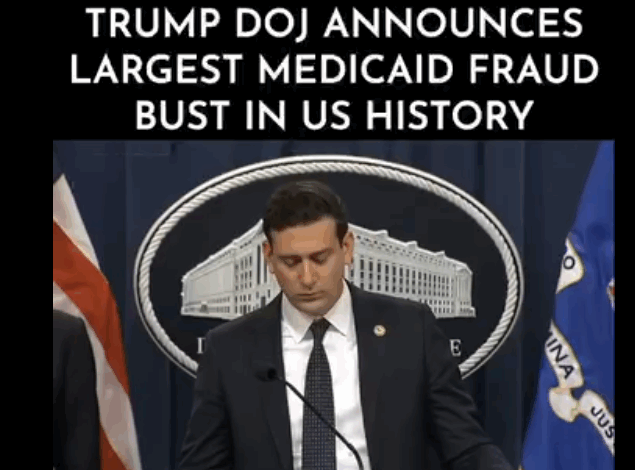Trump-Era DOJ Uncovers Largest Medicaid Fraud Case in U.S. History

In what officials have called a landmark enforcement action, the U.S. Department of Justice (DOJ) under former President Donald Trump announced the largest Medicaid fraud bust in the nation’s history. The operation exposed a massive, multi-state scheme accused of stealing hundreds of millions of dollars from programs designed to help vulnerable Americans.
The announcement came during a major press conference in Washington, D.C., where federal prosecutors outlined how years of investigation and coordination between agencies led to one of the most comprehensive fraud takedowns ever conducted in the healthcare sector.
A Nationwide Investigation
According to senior DOJ officials, the case was the result of an extensive, multi-year probe that involved cooperation among the FBI, the Department of Health and Human Services Office of Inspector General (HHS-OIG), and multiple U.S. Attorneys’ Offices across the country.
“This case represents the most significant enforcement action ever taken against Medicaid fraud,” one DOJ official stated. “The investigation uncovered a vast, coordinated scheme that exploited patients and diverted taxpayer dollars from critical healthcare services.”
The operation, officials said, is part of the federal government’s ongoing effort to strengthen oversight and accountability within public healthcare systems.
How the Scheme Worked
Investigators revealed that the fraudulent network consisted of healthcare providers, medical companies, billing services, and shell corporations that submitted false claims for payment. In many instances, the claims were for treatments that were never performed, procedures that were medically unnecessary, or costs that had been artificially inflated.
Participants in the scheme allegedly used a range of tactics to hide their activities — from falsifying medical records and patient referrals to recruiting real Medicaid recipients under misleading pretenses.
In some cases, individuals were reportedly promised free checkups, prescriptions, or transportation in exchange for providing their personal information, which was later used to generate fraudulent billing.
Exploiting a System Built on Trust
Federal investigators emphasized that the fraud targeted one of the nation’s most important healthcare programs — one that serves millions of low-income families, seniors, and people with disabilities.
“Every dollar stolen from Medicaid is a dollar taken from patients who rely on it for their basic health and wellbeing,” said a spokesperson for the HHS Office of Inspector General. “These criminals took advantage of a system that operates on trust and integrity.”
Officials also noted that many of the fraudulent claims appeared to originate from clinics and billing companies that were established solely to funnel money from government funds into private pockets.
Charges and Legal Consequences
While the full list of defendants was not immediately released, the DOJ confirmed that hundreds of individuals and entities were under indictment, including physicians, pharmacists, administrators, and corporate executives.
The charges range from conspiracy to commit healthcare fraud to money laundering and wire fraud, each carrying severe penalties. Legal experts note that knowingly submitting false claims to Medicaid can result in prison sentences of up to ten years per count, in addition to significant fines and restitution requirements.
Broader Implications for the Healthcare Industry
The case has sent shockwaves through the healthcare community, prompting renewed discussions about how to strengthen safeguards against misuse of public healthcare funds.
Analysts say the investigation highlights ongoing vulnerabilities within Medicaid’s structure — particularly the challenge of verifying claims across thousands of private providers and contractors.
In response, federal officials announced plans to expand the use of data analytics, artificial intelligence, and cross-agency collaboration to detect and prevent fraudulent billing before payments are made.
Trump Administration’s Role in the Crackdown
During his presidency, Donald Trump frequently emphasized government accountability and the protection of taxpayer dollars. The DOJ’s healthcare fraud task forces, expanded under his administration, were tasked with identifying and prosecuting large-scale cases of financial abuse within federal healthcare programs.
This Medicaid fraud case stands as one of the most high-profile outcomes of those efforts, reflecting years of investigative groundwork that began during his tenure.
“This operation demonstrates our commitment to preserving the integrity of public healthcare systems,” said a former senior official involved in the initiative. “No one — no matter how well connected — is above the law.”
The Human Cost of Fraud
Beyond the financial damage, officials stressed the human impact of Medicaid fraud. When funds are stolen or diverted, legitimate patients suffer. Fraudulent billing can delay services, limit access to care, and erode public trust in government-funded health programs.
Healthcare advocates called the case a reminder of why transparency and accountability remain critical. “When people abuse Medicaid, they’re not just stealing money,” said one advocacy group spokesperson. “They’re stealing care — from children, seniors, and people who depend on these services to survive.”
What Comes Next
While the DOJ has not released the total amount of funds recovered so far, early reports suggest that hundreds of millions of dollars in assets have been seized through forfeiture actions, restitution payments, and settlements.
Officials confirmed that investigations are still ongoing and that additional arrests and indictments are expected as evidence continues to unfold.
The Biden administration has since reaffirmed its intention to maintain strict enforcement against healthcare fraud, building upon the systems established during the Trump era.